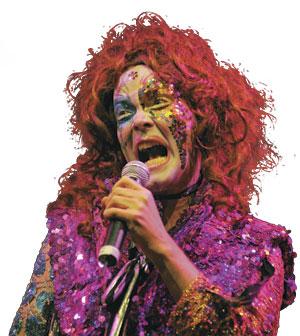“While praising Taylor Mac for his ukulele-playing and gender-bending performances, over 20 publications have, of their own volition, described Mac as Ziggy Stardust meets Tiny Tim.”
Within seconds of Googling Taylor Mac’s name, I found that passage on four separate festival websites.
The articles seemed to be in a giddy battle to outdo each other in their hyperbolic praise of Mac’s work. Seemed like a fitting introduction to his new show.
Except that Comparison Is Violence, or the Ziggy Stardust Meets Tiny Tim Songbook is actually a drag-rock, sequin-fuelled examination of the reductive properties of comparison and its ability to grind us all down to a mushy, indistinguishable pulp of mediocrity.
“It started with one review — in the UK, I think,” Mac recalls when I ask him about the gushing passage. “Then I realized that journalists cut and paste, and it ended up everywhere.”
Damn. Now how do I open my article?
It’s 8am here, and 11am in New York. Last night, Mac presented an excerpt from his 24-hour history of popular music at the legendary Joe’s Pub. This morning you can still hear the excitement in his tired and gravelly voice. He sounds like the love child of Julie Andrews and Tom Waits.
Damn. I did it again.
But how does the caramel-voiced Mac, with his infectious chuckle, expect me to avoid the journalistic shorthand of cultural comparison? It’s not intended to do harm. It’s intended to create an egalitarian point of entry for a potential audience. And the cleverest comparisons will spread across the internet faster than a kitten-falling-asleep video — even as they oversimplify not only the work in question, but the legacy of the work being referenced.
After all, what do I really know about Ziggy Stardust apart from being able to slaughter the lyrics of “Suffragette City”? And Tiny Tim comes off as nothing more than a comical pop-culture footnote. Regardless of how we might remember him, does anyone deserve that fate? And how does any of that serve Mac and the queer-as-fuck art he’s making now?
Mac’s response to the internet-fuelled suggestion that his last show was a pastiche of performers he knew little about, nor had any intention of referencing, was to throw himself wholeheartedly into the creation of a new show using only the music of those two performers.
“Either I’ll kill the comparison or I’ll emerge as a Ziggy Stardust-meets-Tiny Tim butterfly,” he says.
And while he asserts that there is something belittling about the implied resemblances (“When people are comparing you, they’re passive-aggressively saying, ‘You’re not as special as you think you are’”), he also recognizes the excitement of having your work compared to the likes of David Bowie.
“I started doing the research, and I fell in love with both of them,” he says. “When you sing your own songs, there’s a vulnerability. But when you sing someone else’s material, they’re holding part of the burden.”
Sharing that vulnerability with his audience is Mac’s goal. “My job . . . is to remind my audience of the range of their humanity.”
One way he accomplishes this, he suggests, is by willfully presenting himself as the oddest person in the room.
“I believe the more personal risk I take in the work, the more the audience will relate and see the whole of their humanity reflected back at them. So through art I try to be as masculine, feminine, ugly, beautiful, intelligent, base, chaotic, graceful, joyful, sorrowful, perfect and flawed as I am in real life.”
Which means Mac’s success is due, at least in part, to his relative status as Oddest Person in the Room. Compa-ratively speaking.

 Why you can trust Xtra
Why you can trust Xtra


